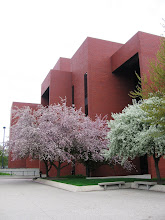Student Ownership of Coursework
When it comes to student intellectual property rights, the Ball State University Libraries are unique. This is because they are the only higher education library in Indiana, and just one of the few nationwide, to have a copyright page dedicated solely to student ownership rights. The page can be viewed at www.bsu.edu/library/collections/copyright/students.
The Copyright for Students page emphasizes the fact that students have copyright protection in any and all of the works they create for any purpose, including anything created for their class assignments. The exclusive rights guaranteed by the U.S. Copyright Law to students, faculty, and any creator of intellectual property are these:
1. The right to allow or decline the making of copies of your work
2. The right to allow or decline the distribution of your work
3. The right to allow or decline a public performance of your work
4. The right to allow or decline a public display of the work
5. The right to allow or decline the making of a derivative work
A good question to ask is, “What is a derivative work?” as mentioned in the fifth point above. A derivative work is any work or works created from the original, including translations, musical arrangements, dramatizations, fictionalizations, a motion picture, a sound recording, an art reproduction, an abridgment, a condensation, or any other form in which a work may be recast, transformed, or adapted.
The Copyright for Students page has important information on academic integrity including three videos and the link to the “Ball State Code of Student Rights and Responsibilities” that addresses academic dishonesty.
The videos at the Copyright for Students page includes, first of all, a 30-second video that briefly iterates the student rights defined by the Copyright Law and the need for Ball State University faculty to seek permission to use student-produced intellectual property. The second is another 30-second video on plagiarism. The third video is entitled, “What Do You Think about Intellectual Property?” sponsored by the Recording Industry Association of America. This video stresses the proper use of someone else’s intellectual property.
Using someone else’s materials for research, articles, papers, audiovisuals, PowerPoints, etc., can rely on a Fair Use analysis or these educational uses can rely on materials that are in the public domain, royalty free, and/or licensed for educational use.
The Copyright for Students page includes several useful links to these latter types of materials including:
• Royalty Free Music and Sound Effects
• Free Listening and Free Music Clips
• Free Retro Ringtones
• Royalty Free Pictures for Your Blogs, Homepage, Research Paper, etc.
• Royalty Free Sites for Pictures, Graphics, Video & Audio Podcasts
The Royalty Free Pictures link provides access to hundreds of thousands of Associated Press photos that can be used for any educational use at Ball State by students and faculty as well. The licensed, educational royalties for these AP photos for use anywhere on the Ball State campus have been paid for by the University Libraries.
The University Libraries’ unique Copyright for Students page is applicable and useful for basic understanding of using intellectual property and for an understanding of the rights involved in materials created for course assignments, research, course enhancements, instructional objectives, learning outcomes, etc., to name just a few ways and activities in which this page can be used.
It should be obvious that students and faculty have the very same, exclusive rights as defined and guaranteed by the Copyright Law. The Copyright for Students page helps our young scholars to identify a baseline in how to legally use someone else’s copyrighted materials for educational purposes. The wide scope of the Copyright for Students page is such that it can be useful for faculty as well.
This article is the second in a series of articles on Intellectual Property Issues in Higher Education. Next time: How to Copyright Your Work.
For additional information or to have your questions answered, please contact Dr. Fritz Dolak, The University Libraries’ Copyright and Intellectual Property Office, FDolak@bsu.edu, (765) 285-5330.
Labels: Ball State University Libraries, Copyright Conference, derivative work, intellectual property, students' rights


0 Comments:
Post a Comment
<< Home